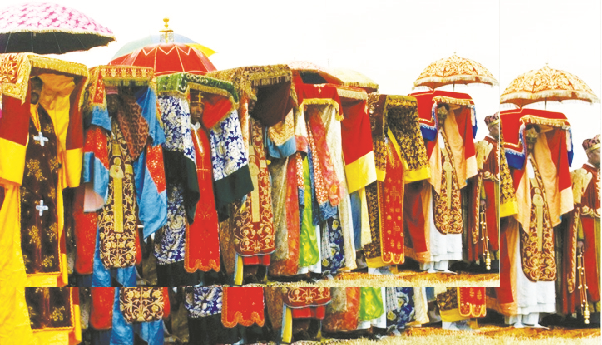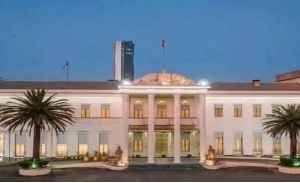
Timket, also known as the Ethiopian Epiphany, is a vibrant and revered festival celebrated in Ethiopia. It holds profound significance in the Ethiopian Orthodox Tewahido and Catholic Christian faiths and is considered as one of the most important religious and cultural events in the country. Timket commemorates the Baptism of Jesus Christ in the Jordan River and is characterized by elaborate ceremonies, processions, and rituals.
Timket (Commemoration of Jesus’s Baptism) is a must-see ritual festival in Ethiopia, explain tourists who have a chance to attend the event in Addis Ababa, Gondar and other parts of the country. The ceremonial occasion is undertaken with appealing Ethiopian Orthodox Tewahido Church (EOTC) Sunday school students’ songs, priests sanctify, various religious benediction, different cultural songs, cultural dancing, among others. The day gives an opportunity for local participants and tourists to discover most of the cultural dressings found in Ethiopia.
Not only this, one will be satisfied while observing the colorful dressing of peoples added with smiley faces without age limitations. That means kids to elders are seen chanting, thanking God and walking peacefully with the crowded gathering without being tired. The religious leaders sanctify the youths for their day in day out strives that longs at least for a week to make the celebration colorful and real.
Timket, the colorful celebration of the Ethiopian Epiphany, was inscribed as the intangible cultural heritage by UNESCO. The organization inscribed Timket (Ethiopian Epiphany) as an intangible cultural heritage of humanity. Its registration under the prestigious heritage list gives impetus to easily marketing the country’s tourism sector. In addition, Timket itself will gain an opportunity to attract more tourists worldwide.
Recently, the Amhara State Culture and Tourism Bureau announced regarding the Timket festivals, which will be colorfully celebrated in the State. The Bureau Public Relations Head Abebe Himbale told the Ethiopian Press Agency (EPA) that Amhara State is among the predominant areas where Ethiopian Christmas and Epiphany festivals are celebrated in the country. Therefore, the Timket festival will be celebrated with the intention to revive the stagnant tourism sector in the State.
As to him, more than a million people attended each of the two festivals last year and steps have been taken to celebrate the festivals in a similar condition this year. As to the Head, the Bureau has been working in collaboration with Ethiopian Airlines, tour guide associations, hotels and other institutions as the Ethiopian Airlines has allowed direct flight from Bahir Dar to Lalibela and Gondar to Lalibela for the visitors coming to attend the festivals in consideration of Christmas and Baptism.
Timket is among the leading festivals that are attended by prominent personalities from the international diplomatic community. Most diplomats based in Addis Ababa also attend Ketera (Timket eve) and Timket annually. There are also other street ceremonial occasions held in the country like; the Meskel (Founding of the true cross) festival held in September annually.
Addis Ababa City Administration Culture and Tourism Senior Heritage Intangible Heritages Senior Expert Memhir Mekibib Gebremariam told The Ethiopian Herald that Timket is solely celebrated colorfully with the gathering of more than tens of thousands of people in Ethiopia in places like in Jan-Meda in Addis Ababa. It is also marked colorfully with a huge gathering in Gondar City.
As Timket is registered in the UNESCO’s heritage list, it becomes exclusively Ethiopia’s unique intangible heritage. And no other country celebrates Timket in a manner it is marked in Ethiopia.
The public is enthusiastic to mark the day with joy being invincible to the cold weather at night (while sleeping inside a pavilion or simply on the sky free ground counting stars) or warm temperature during the noon.
He elaborated that the country is home to a variety of tangible and intangible heritages in Africa in which twelve [nine tangible and three intangible] heritages have already been registered by UNESCO, however, the figure might not be sufficient enough since the country has surplus tangible and intangible heritages waiting to be registered, he said.
According to him, Timket is not only a religious holiday but also a cause to preserve and pass down the unique cultural heritage to the future generations. It also plays an indispensable role to promote, introduce and preserve each nation, nationalities and people’s forefather’s culture.
“Timket is one of the foremost celebrations to show Ethiopia and its nation, nationalities, and peoples to the rest of the world at no cost without for promotions.”
Timket is playing the lion’s share in preserving the country’s diversified religious and cultural assets. During Timket, elders move to escort the arks of the covenant (Tabots) accompanying it and thanking God, catching their fly whisk, as well as a small stick, sparkled with the colors of the Ethiopian flag. Youths on the other side freely and joyously chant and dance before the arks.
Although, it is not possible to say that globalization is not posing challenges on the cultural celebration of Timket currently, the youths have become steady to overcome the impact properly. It is possible to witness that the youths are mindful of how to preserve their culture and the value of the untapped intangible cultural heritage of the country.
The youth mostly show commitment towards keeping their own cultural assets through wearing cultural clothes, giving attention to local music and dancing.
In sum, the Timket is a colorful festival celebrated all over Ethiopia to commemorate the Baptism of Jesus Christ by John the Baptist in the River Jordan. The commemoration starts on the eve of the main festival on 19 January. The eve is known as Ketera, which means blocking the flow of water for the blessing of the celebrants. On the eve of Timket, people escort their parish church Tabot (replicas of the Ark of the Covenant) to Timkete-Bahir (a pool, river or artificial reservoir), transported by a priest of the parish and accompanied by a great ceremony.
The people spend the night attending night-long prayers and hymn services. Hundreds of thousands participate in the actual festival on the following day – 20 January. The celebration starts early in the morning with pre-sunrise rituals. These are followed by the sprinkling of the blessed water on the congregation, as well as other ceremonies.
At around 10 a.m., each Tabot begins its procession back to its respective church, involving an even more colorful ceremony with various traditional and religious songs. The viability of the element is ensured through its continued practice, with Orthodox clergy playing a pivotal role: they sing the praises dedicated to the rituals and hymns, carry the Ark, and preach relevant texts.
BY TEWODROS KASSA
THE ETHIOPIAN HERALD FRIDAY 19 JANUARY 2024





